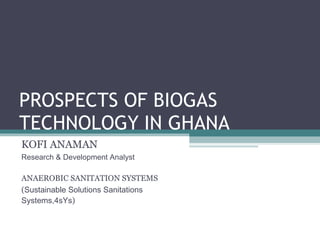Potential Of Biogas Technology In Ghana
- 1. PROSPECTS OF BIOGAS TECHNOLOGY IN GHANA KOFI ANAMAN Research & Development Analyst ANAEROBIC SANITATION SYSTEMS ( Sustainable Solutions Sanitations Systems,4sYs )
- 2. OUTSIDE THE BOX THOUGHTS!! Did you know A total of 88,144 m 3 of biogas could be produced daily from dung which could generate about 107.7 MWh of energy daily which can support the energy needs of 300 households annually? A grand total of 121,700 m 3 of gas could be produced and could replace of 138.8 tonnes of firewood daily?? A potential output of 360,000 tons of liquid organic fertilizer which is capable of fertilizing about 70,000 ha of irrigated farmland or 140,000 ha of dry farmland from the dung portion of the waste??
- 3. WASTE MANAGEMENT CHALLENGES IN GHANA Rapid growth urban population. Changes in consumption patterns Inadequate sites and facilities for waste management operations Negative habits and apathy of the general public towards the environment giving raise to the practice of open defecation , flying toilets etc. Inadequate equipment and operational funds to support management efforts.
- 4. WASTE MANAGEMENT CHALLENGES IN GHANA FACTS( Housing and Populations Census 2000) 4.8% of households in Ghana have their waste collected from their dwellings. 7.9% of households burn their refuse. 57.6% employ receptacles for storage and send to designated dump sites. 25.9% of households dump their refuse at unspecified locations including drains, embankment of water courses, rivers, wetlands.
- 5. NEGATIVE WASTE HABITS & PRACTICES
- 6. IMPACTS ASSOCIATED WITH NEGATIVE PRACTICES Direct Impacts Water pollution(Surface and ground) Land degradation Emissions of harmful gases Destruction of Ecosystem Air Pollution Poor aesthetics
- 7. IMPACTS ASSOCIATED WITH NEGATIVE PRACTICES Indirect Impacts Public Health problems;80% ailments reported in Ghana are associated with inadequate sanitation and therefore preventable. Poverty Climate Change; flooding Ecological Imbalance Threat to hydro-energy sources.
- 8. SUSTAINABLE WASTE MANAGEMENT(SWM) Initials Thoughts Generating electricity from garbage and pollution ??
- 10. SWM- PARADIGM Waste as resource/raw material for energy and fertilizer production. Appropriate and Economically sound technologies that combine solid waste and wastewater treatment and energy production can simultaneously protect the surrounding environment and enhance energy production.
- 11. BIOGAS TECHNOLOGY Biogas is derived through Anaerobic Digestion(AD) of organic solid waste(agricultural waste, municipal and industrial waste). AD consist of several independent, complex, sequential and parallel biological reactions in the absence. In the process, the product from one group of microorganisms serve as the substrates for the next. At the end, a mixture of gases(biogas) is produced. Biogas comprise mainly of methane and carbon dioxide.
- 12. ANAEROBIC DIGESTION FLOW CHART
- 13. PERSPECTIVES ON BIOGAS TECHNOLOGY Sustainably addressing Health Sanitation Environmental Impacts of ground and surface water contamination and Landfills Land use pattern Economically addressing Water use and reuse-water recycle Cesspool emptying and its impacts Beneficial use of biogas-electricity, cooking , refrigeration
- 14. FIXED-DOME AD PLANT ( Hohlfield and Sasse,1986 )
- 15. COMPONENTS OF AD SYSTEM THE BIO-DIGESTER COMPENSATION TANK/CHAMBER EFFLUENT TREATMENT SYSTEM TREATED EFFLUENT STORAGE BIOGAS STORAGE BALLOON END-USE ACCESSORIES
- 16. BIOGAS COMPONENT
- 17. BIOGAS FILTRATION SYSTEM Methane component should be increased(from 60% to 90%) to enhance the calorific value of the gas. Also to remove H2S which causes corrosion . To achieve this , Chemical adsorption; Using Iron-chelated solution. High pressure water scrubbing ;simple and easy process Pressure swing adsorption Cryogenic separation Membrane separation Local option and low-cost options??
- 18. BIOGAS UTILIZATION Cooking- biogas stoves Electricity- Generators, biogas lamps Refrigeration
- 20. ELECTRICITY
- 21. REFRIGERATION
- 22. TREATED EFFLUENT USAGE For non-critical applications Landscaping Flushing Toilets
- 23. Economics Perspective Feasible minimum plant size -8m3 With per m3 charge $200-300(depending prevailing soil conditions). No regular cesspool emptying services; Low operational charges, reduced environmental pollution. Estimated life span of AD plant 30-40 years with minimal or no maintenance. All these freebies plus energy(electricity,cooking gas) & fertilizer production makes this technology economical and environmentally friendly.
- 24. Thank you!!!!!!!!!!!!!!!!!!! ANAEROBIC SANITATION SYSTEMS (Sustainable Solutions Sanitation Systems, 4sYs) 36 Kofi Annan Avenue, Second Link NORTH LEGON, ACCRA-GHANA E-mail: sssansystems.anaman@gmail.com Mobile : 0244187173























